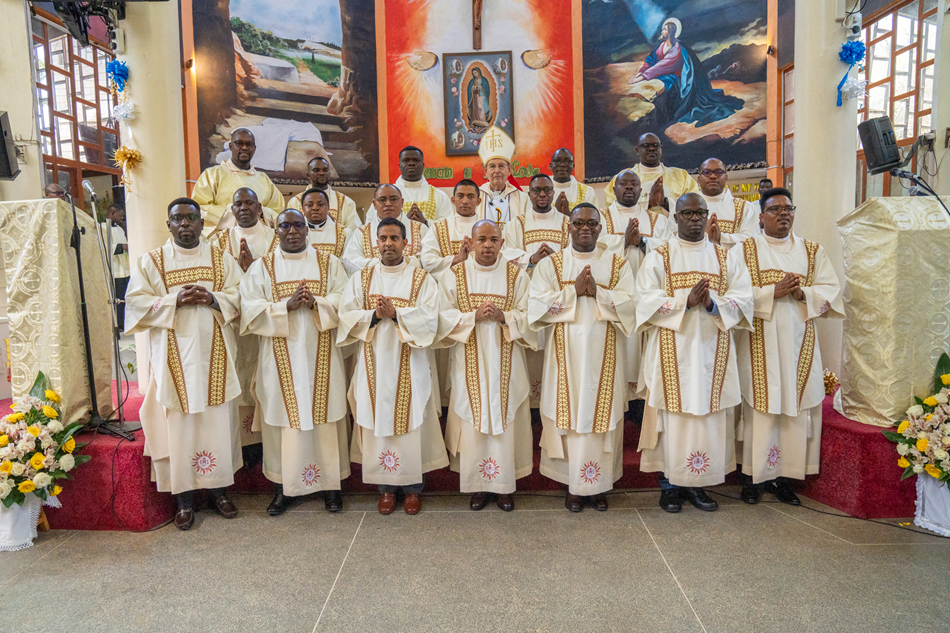
The smiles on their faces were invincible, a sign of brimming joy coming from deep within their hearts; the joy of finally receiving the first sacrament in the Holy Orders! It was indeed a great joy not just for the diaconate ordination candidates but to all who were present to witness the colourful ceremony, as 18 Jesuit scholastics were being ordained deacons on 10 th February 2024 at Our Lady of Guadalupe Parish in Nairobi.
The ordaining Minister Bishop, Rodrigo Mejía Saldarriaga S.J., Vicar Apostolic Emeritus of Soddo, Ethiopia, and Titular Bishop of Vulturia, explained in his homily that the diaconate ordination is the first way to participate in the Sacrament of Holy Orders, a sacrament that has three levels or three ways of participation: the deacon, the priest, and the bishop. While clarifying that the Church today has two classes of deacons, married deacons who are also known as permanent deacons, and the transitional deacons like the scholastics who were being ordained, the transitional diaconate does not mean provisional or temporary.
I want to clarify that what we are doing today will not be canceled a few months later by the ordination of priests, rather it means they are deacons forever and that is different from the degrees in the army where when a lieutenant is promoted to captain, he forgets all the duties of a lieutenant and serves as a captain,” Bishop Rodrigo explained.
Bishop Rodrigo further explained that Church ministries are not degrees of promotion, honours, or power, but different attitudes of service. Therefore when one becomes a priest, he remains a deacon, and even if he becomes a bishop, he remains a servant, a deacon with a spirituality ofservice. Even the Pope is a deacon, expressed in his title servus servorum Dei ,servant of the servants of God. He said that this spirituality of service is the charism, the seal that deacons like the ones being ordained, receive to orient them to serve not only the liturgy but also human service, service to the church, and service to the community. Bishop Rodrigo explained that the service requested of the ordained ministers is simply presented in three words; Communion, Participation, and Mission. He offered that communion goes beyond the distribution of the Eucharist because it is an invitation to be community builders, builders of communion among people, artisans of peace, and pastors of reconciliation, which is a great challenge in our divided and polarized society today, a society that is torn apart by wars, violence, corruption, and many other vices. Regarding participation, Bishop Rodrigo said that to be a deacon is not to bring a decoration but to do something, to participate in the mission of the church. “Participation requires an active attitude, a creative attitude so that we don’t wait to be told but we invent with a creative fidelity new ways of announcing the Gospel.”
About the mission, the bishop said that there must be a distinction between the mission and the
ministries because the ministries are ways of performing the mission. “The mission is the same
for all, it is the mission at the service of the kingdom of God.”
The 18 ordained deacons are currently concluding their Bachelor of Theology program at Hekima Jesuit School of Theology and will proceed to their provinces in May for other missions. The ordained deacons come from various African countries, including Kenya (three candidates), Tanzania, Ethiopia & Sudan (one candidate each), Nigeria (one candidate), DRC (three candidates), Congo Brazzaville (one candidate), Cameroon (two candidates), Mozambique (one candidate), Zimbabwe (two candidates), and Madagascar (two candidates). One of the newly ordained deacons, Ricardo Nogueiro SJ, described the moment as overwhelming. “I’m still processing it all,” he said as he asked for prayers. His sentiments were shared by Deacon Sajilo Mark Julius who expressed that the joy he felt after the ordination was so great that for a while he couldn’t even eat.
“I felt very happy and thankful to God that I didn’t even feel hungry! I could not eat for the whole day as I just wanted to share my joy with the relatives, friends, and guests who had come to witness our ordination. I am truly thankful to God that this far, he brought us,” Deacon Sajilo said, as he also asked for accompaniment in prayers.
A second-year student at the Jesuit School of Theology Goukpanian Rogatien SJ from Benin, testified that he felt very happy for the newly ordained deacons, especially those whom he has been together with in other stages of their Jesuit formation: Frank Kontche and Joel Kouam, both from Cameroon. “What was going on in my mind as I witnessed them being ordained is that next year, God willing, I will be dressed like them and experience the same joy of finally being ordained,” he said. One of the formators at Hekima Jesuit Community who has journeyed with the candidates said that the ordination of the deacons is one of the greatest moments of grace, of experiencing the peak of Christianity. "Some of these guys have been in formation for 11 years, 14 years or more, and when they are finally ordained, I believe that there is a transformation, an ontological change such that even though they are the same people we know, they have been transformed by the sacrament," said the Jesuit formator who chose to remain anonymous.
By Pamela Adinda, Communications Coordinator